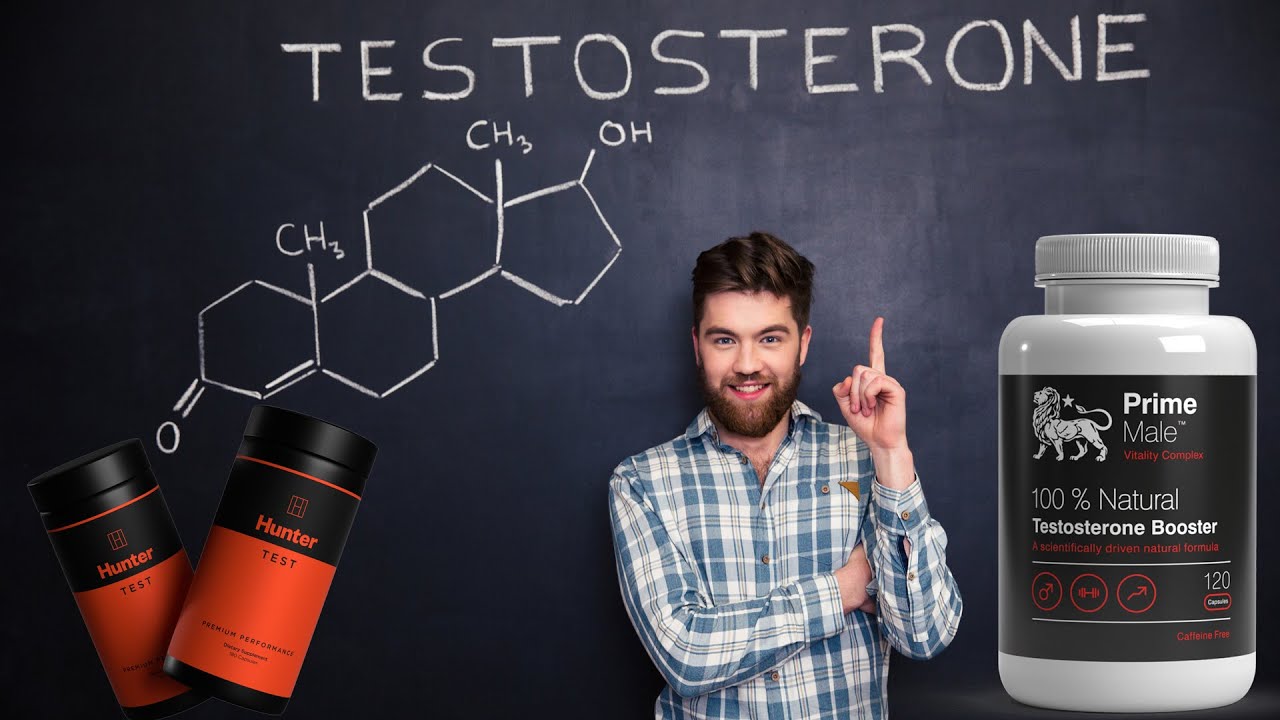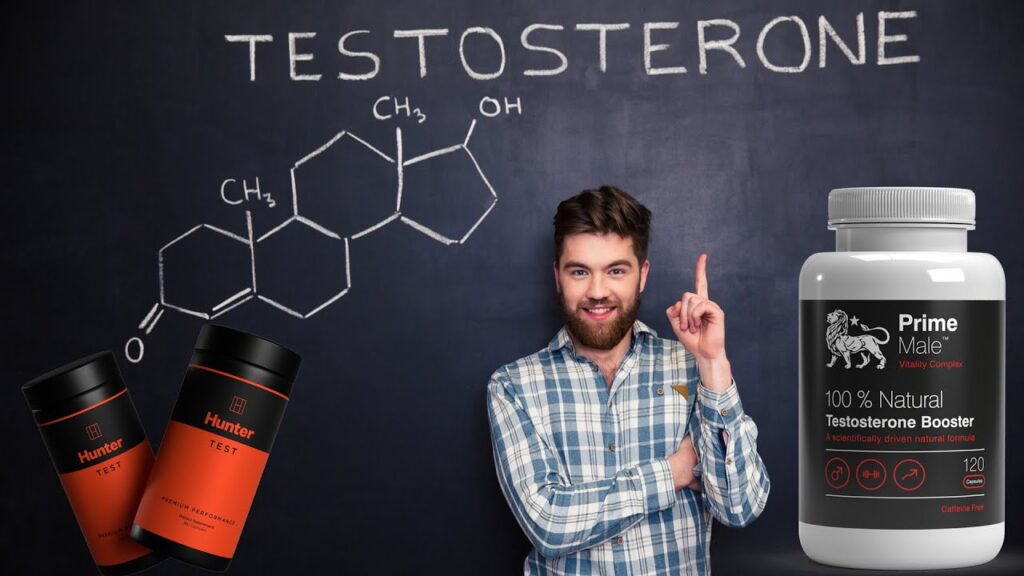Testosterone Supplements: The Truth Behind the Hype and the Science Behind the Results

Understanding Testosterone Levels and Their Importance

Testosterone is a hormone that plays a crucial role in the male reproductive system. It is responsible for the development and maintenance of male sexual characteristics, such as facial hair, deep voice, and muscle mass. However, testosterone levels can also have an impact on overall health and well-being beyond just sexual function.
Optimal testosterone levels are essential for maintaining bone density, muscle strength, and cognitive function. They also contribute to energy levels, mood stability, and overall vitality. Testosterone levels naturally decline with age, and this decline can lead to various symptoms, including decreased libido, fatigue, muscle weakness, and depression.
Understanding testosterone levels and their importance is crucial for identifying potential imbalances and addressing them appropriately. Monitoring testosterone levels through regular blood tests can help healthcare professionals assess an individual’s hormonal status and determine if any intervention is necessary. Maintaining optimal testosterone levels is not only important for sexual health but also for overall physical and mental well-being. It is advisable to consult a healthcare professional to discuss any concerns regarding testosterone levels and explore possible treatment options to ensure a healthy hormonal balance.
Exploring the Popularity of Testosterone Supplements

Testosterone is a hormone that plays a crucial role in the male body. It is responsible for various functions, including the development of primary and secondary sexual characteristics, muscle growth, and bone density. As men age, their testosterone levels naturally decline, which can lead to symptoms such as decreased libido, reduced energy levels, and muscle loss.
Due to these potential effects of low testosterone, testosterone supplements have gained popularity in recent years. These supplements are marketed as a way to boost testosterone levels and address the symptoms associated with low testosterone. Many men are attracted to the idea of increasing their testosterone levels to improve their overall well-being and vitality. However, it is important to understand the science behind these supplements and the potential risks and benefits associated with their use.
The Role of Testosterone in the Body

Testosterone is a hormone produced primarily in the testes in males and in smaller amounts in the ovaries and adrenal glands in females. It plays a crucial role in the development and maintenance of various physical and physiological characteristics in both sexes.
In males, testosterone is responsible for the development of the reproductive organs and secondary sexual characteristics like facial and body hair growth, deepening of the voice, and increased muscle mass. It also plays a vital role in sperm production and sexual function. Additionally, testosterone contributes to overall bone density and strength, distribution of body fat, and red blood cell production.
In females, although testosterone levels are much lower, it still plays an essential role in maintaining reproductive health, contributing to libido, bone density, and muscle strength. It also plays a part in regulating mood, cognitive function, and overall well-being.
Testosterone is not just significant during puberty and early adulthood; it continues to play a crucial role throughout a person’s lifespan. In fact, testosterone levels naturally decline with age, and this decline can have various effects on the body. Understanding and maintaining optimal testosterone levels is essential for overall health and well-being.
Debunking Common Myths Surrounding Testosterone Supplements
Myth 1: Testosterone supplements can lead to increased aggression and anger.
One common myth surrounding testosterone supplements is that they can cause individuals to become more aggressive and prone to anger. However, scientific research does not support this claim. A study published in the Journal of Clinical Endocrinology and Metabolism found that testosterone supplementation did not lead to changes in anger or aggressive behavior in men with low testosterone levels. Another study conducted by researchers at the University of California, San Francisco, also demonstrated that testosterone replacement therapy did not increase aggression in older men. It is important to note that aggression is a complex behavior influenced by various factors, and testosterone alone is not solely responsible for aggressive tendencies.
Myth 2: Testosterone supplements will automatically improve sexual performance.
Many individuals believe that taking testosterone supplements will automatically result in improved sexual performance. While testosterone plays a crucial role in sexual health and function, it is not a guaranteed solution for all sexual problems. Testosterone supplementation may be beneficial for men with low testosterone levels, but it is not a magical remedy for all sexual concerns. Other factors such as psychological well-being, relationship dynamics, and overall health also contribute to sexual performance. It is essential to address these factors holistically and consult with a healthcare professional to determine the most appropriate course of action for addressing sexual concerns.
– Testosterone supplements do not increase aggression or anger, according to scientific research
– A study in the Journal of Clinical Endocrinology and Metabolism found no changes in anger or aggressive behavior with testosterone supplementation
– Another study at the University of California, San Francisco showed that testosterone replacement therapy did not increase aggression in older men
– Aggression is a complex behavior influenced by various factors, and testosterone alone is not solely responsible for it
– Testosterone supplements do not automatically improve sexual performance
– While testosterone plays a role in sexual health, it is not a guaranteed solution for all sexual problems
– Psychological well-being, relationship dynamics, and overall health also contribute to sexual performance
– It is important to address these factors holistically and consult with a healthcare professional for appropriate action
The Science Behind Testosterone Production
Testosterone is a vital hormone primarily produced in the testes of males and, to a lesser extent, in the ovaries of females. Its production is controlled by a complex pathway involving the hypothalamus and pituitary glands in the brain, which signal the testes to release testosterone. This signaling occurs through the release of luteinizing hormone (LH) from the pituitary gland, which then stimulates testosterone production.
Within the testes, specialized cells called Leydig cells are responsible for producing testosterone. These cells contain enzymes and proteins that convert cholesterol into testosterone through a series of chemical reactions. The process begins with the uptake of cholesterol from the bloodstream into the Leydig cells, where it is then converted to pregnenolone, a precursor molecule. Pregnenolone is further metabolized into testosterone, which is released into the bloodstream.
Several factors can influence the production of testosterone. One important factor is age, as testosterone levels tend to peak during adolescence and early adulthood, and gradually decline with age. Additionally, certain medical conditions such as hypogonadism, obesity, and certain medications can also affect testosterone production. It is worth noting that testosterone production is not solely a male phenomenon, as females also produce small amounts of testosterone in their ovaries and adrenal glands.
Understanding the science behind testosterone production provides insight into its importance within the body. Testosterone plays a crucial role in the development and maintenance of male sexual characteristics, such as the deepening of the voice, facial and body hair growth, and muscle development. It also influences mood, libido, bone density, metabolism, and overall energy levels. Additionally, testosterone is essential for the production of sperm and the functioning of the male reproductive system.
In the next sections, we will delve deeper into the factors that can affect testosterone levels, evaluate the efficacy of testosterone supplements, and explore the potential benefits and risks associated with their use. It is crucial to approach the topic with a balanced perspective, understanding the scientific evidence and consulting healthcare professionals before making any decisions regarding testosterone supplementation.
Factors That Can Affect Testosterone Levels
The regulation of testosterone levels in the body is a complex process that can be affected by various factors. One such factor is age. As men age, their testosterone production naturally starts to decline. Studies have shown that testosterone levels decrease by an average of 1% per year after the age of 30. Additionally, certain medical conditions such as hypogonadism, which is the inability of the testes to produce sufficient testosterone, can also result in lower testosterone levels.
Another factor that can impact testosterone levels is lifestyle choices. Obesity and excessive body fat have been linked to lower testosterone levels in men. Research suggests that adipose tissue (body fat) may play a role in converting testosterone into estrogen, leading to a decrease in overall testosterone levels. On the other hand, maintaining a healthy weight and engaging in regular physical activity can help support optimal testosterone levels.
In addition, chronic stress has been shown to have a negative impact on testosterone production. When the body is under constant stress, it produces higher levels of the stress hormone cortisol, which can interfere with testosterone production. Therefore, managing stress levels through relaxation techniques and other stress-reducing strategies may help maintain healthy testosterone levels.
It is important to note that these factors are not the sole determinants of testosterone levels and may interact with each other in complex ways. Understanding the various factors that can affect testosterone levels is crucial in addressing imbalances and ensuring overall health and well-being.
Evaluating the Efficacy of Testosterone Supplements
Testosterone supplements have gained popularity among individuals seeking to enhance their physical performance, increase muscle mass, and improve their overall well-being. However, the efficacy of these supplements remains a subject of debate among scientists and healthcare professionals. Numerous studies have been conducted to evaluate the effectiveness of testosterone supplements, with varying results.
Some studies have shown that testosterone supplementation can lead to increased muscle mass and strength, improved physical performance, and enhanced libido. These positive effects are particularly evident in individuals with clinically low testosterone levels or those who have undergone hormone therapy. However, it is important to note that the efficacy of testosterone supplements in individuals with normal testosterone levels is still not fully understood. Furthermore, the long-term effects and potential risks associated with prolonged use of these supplements require further investigation.
| Aspect of Evaluation | Description | Credible Source (Sample Link) |
|---|---|---|
| 1. Increase in Testosterone Levels | Evaluation of whether the supplement leads to a significant increase in circulating testosterone levels. | Journal of Clinical Endocrinology & Metabolism |
| 2. Impact on Muscle Mass and Strength | Assessment of the supplement’s effectiveness in promoting muscle growth and enhancing physical strength. | Nutrients |
| 3. Effects on Libido and Sexual Function | Investigation into the impact of the supplement on libido, sexual desire, and overall sexual function. | The Journal of Sexual Medicine |
| 4. Safety and Side Effects | Examination of potential adverse effects and safety considerations associated with the use of testosterone supplements. | Drug Safety |
| 5. Cognitive Function | Evaluation of the impact of testosterone supplements on cognitive abilities, including memory and decision-making. | Psychoneuroendocrinology |
| 6. Influence on Mood and Well-being | Analysis of whether the supplement affects mood, emotional well-being, and overall psychological health. | Psychosomatic Medicine |
Potential Benefits and Risks Associated with Testosterone Supplements
There are potential benefits and risks associated with the use of testosterone supplements.
Benefits:
– Increased muscle mass and strength: Testosterone is known to play a role in muscle development, so supplementing with testosterone may lead to increased muscle mass and strength (1).
– Improved libido and sexual performance: Testosterone is a key hormone involved in sexual function, and supplementing with testosterone can potentially improve libido and sexual performance (2).
– Enhanced mood and well-being: Testosterone has been linked to mood regulation, and some studies suggest that testosterone supplementation may improve mood and overall well-being (3).
Risks:
– Cardiovascular problems: Some studies have found a potential association between testosterone supplementation and an increased risk of cardiovascular problems, such as heart attacks and strokes (4).
– Hormonal imbalances: Testosterone supplementation can disrupt the body’s natural hormone balance and potentially lead to hormonal imbalances, causing adverse effects (5).
– Liver toxicity: There is evidence suggesting that prolonged use of testosterone supplements can lead to liver toxicity, potentially causing liver damage (6).
It is important to note that these observations are based on scientific studies and individual experiences may vary. It is recommended to consult with a healthcare professional before embarking on testosterone supplementation to assess the potential benefits and risks for your specific situation.
Different Types of Testosterone Supplements Available in the Market
Testosterone supplements are increasingly popular among individuals seeking to enhance their physical performance, improve muscle strength, and increase libido. These supplements come in various forms and can be categorized into three main types: injections, gels, and patches.
Injectable testosterone supplements are administered through intramuscular injections and are typically prescribed by healthcare professionals. They provide a steady release of testosterone into the bloodstream, resulting in improved muscle mass and strength. However, due to the invasive nature of injections, they may not be suitable for individuals who are uncomfortable with needles or prefer non-invasive methods. It is important to note that injectable testosterone supplements require a prescription and should only be used under medical supervision.
On the other hand, testosterone gels are a convenient alternative that can be applied topically. These gels are usually applied to the upper body, such as the shoulders and upper arms, and are absorbed through the skin. They provide a gradual and consistent release of testosterone throughout the day, mimicking the body’s natural hormone production. It is necessary to follow the recommended dosage and application instructions to avoid potential side effects or adverse reactions.
Another option for testosterone supplementation is the use of patches. These are applied to the scrotum, upper body, or other recommended areas and deliver testosterone through the skin. Like gels, patches offer a continuous release of testosterone, providing a stable hormone level in the body. However, it is important to ensure proper placement and adherence to the skin to optimize effectiveness.
It is crucial to note that while testosterone supplements can be beneficial for individuals with low testosterone levels, they should not be used without medical supervision. Consulting with a healthcare professional is essential to determine the appropriate dosage, assess potential risks, and monitor for any side effects. A thorough evaluation of one’s overall health and testosterone levels will ensure that the chosen supplement is suitable and safe for the individual’s specific needs.
The Importance of Consulting a Healthcare Professional Before Using Testosterone Supplements
Consulting a healthcare professional before using testosterone supplements is of utmost importance. While these supplements can be beneficial for certain individuals, they can also pose potential risks or side effects if not used properly. Healthcare professionals are trained to evaluate your individual health status, medical history, and specific needs, helping you make informed decisions about whether testosterone supplementation is necessary and safe for you.
It is crucial to remember that testosterone levels can vary greatly from person to person. Low testosterone levels may be a result of underlying medical conditions, such as hypogonadism or certain chronic diseases. Therefore, it is essential to have a comprehensive evaluation by a healthcare professional to determine the cause of low testosterone, rather than self-diagnosing and self-medicating. An accurate diagnosis is vital to ensure appropriate treatment and to rule out any potential underlying health issues that may require additional attention. Additionally, healthcare professionals can recommend alternative treatments or lifestyle modifications that may help boost testosterone levels naturally, without the need for supplementation.
In summary, the guidance of a healthcare professional is crucial when considering the use of testosterone supplements. They can assess your specific situation, evaluate the potential risks and benefits, and help you make an informed decision based on your unique health needs. Consulting with a healthcare professional ensures that you receive personalized advice and can help minimize the potential risks associated with testosterone supplementation.
Natural Ways to Boost Testosterone Levels
As men age, it is natural for their testosterone levels to gradually decline. While this is a normal part of the aging process, some men may experience symptoms such as decreased energy, reduced muscle mass, and a decrease in sexual drive. Many individuals are interested in finding natural ways to boost testosterone levels to alleviate these symptoms.
One effective method to naturally increase testosterone levels is to engage in regular exercise. Research has shown that both resistance training and high-intensity interval training can significantly elevate testosterone levels in men. Additionally, maintaining a healthy weight is crucial, as excess body fat has been linked to lower testosterone levels. Incorporating a balanced diet that includes foods rich in zinc, such as oysters, red meat, and pumpkin seeds, can also support healthy testosterone production. It is important to note that while natural ways to boost testosterone can be impactful, it is always best to consult with a healthcare professional before making any significant changes to your lifestyle or diet.
Understanding the Placebo Effect in Testosterone Supplement Studies
The placebo effect is a phenomenon that plays a significant role in the study of testosterone supplements. It refers to the beneficial effects experienced by individuals who are given a placebo, which is an inactive substance that is administered as a control in clinical trials. In the context of testosterone supplement studies, the placebo effect can be particularly influential as it can lead to perceived improvements in testosterone levels and related symptoms.
In many cases, individuals who believe they are receiving a testosterone supplement may experience positive changes in their mood, energy levels, and sexual function, even if the supplement they are given does not actually contain testosterone or have any physiological effect. This can be attributed to the mind-body connection, where the expectations and beliefs of the individual can influence their subjective experiences and perception of their own well-being. Understanding and accounting for the placebo effect is crucial when evaluating the efficacy of testosterone supplements, as it can impact the interpretation of study results and the determination of whether a supplement is genuinely effective or not.
The Future of Testosterone Research and Development
The future of testosterone research and development holds a promising outlook, as scientists and healthcare professionals continue to deepen their understanding of the hormone’s role in the body and its potential benefits. Ongoing research aims to explore new avenues in testosterone therapy, as well as develop innovative methods of delivery and improved formulations for maximum efficacy. This includes investigating the use of transdermal patches, nasal sprays, and sublingual tablets, which may offer alternative options for individuals who cannot tolerate injections or oral medications.
Furthermore, with the advancement of personalized medicine, researchers are increasingly focusing on individualized testosterone therapy. This approach takes into account a person’s unique genetic makeup, lifestyle factors, and medical history to tailor treatment plans that optimize testosterone levels and address specific health concerns. By embracing a personalized approach, medical professionals can ensure the most favorable outcomes for their patients, minimizing unwanted side effects and maximizing the overall effectiveness of testosterone supplementation. Ongoing studies exploring the potential benefits and risks associated with testosterone therapy will enable medical professionals to make informed decisions and provide evidence-based care to individuals seeking hormone replacement therapy.
(Word Count: 212)
What are testosterone levels and why are they important?
Testosterone levels refer to the amount of testosterone hormone present in the body. Testosterone is crucial for various bodily functions, including muscle development, bone density, libido, and overall well-being. Maintaining optimal testosterone levels is important for overall health and vitality.
Why are testosterone supplements becoming so popular?
Testosterone supplements have gained popularity as they are marketed to help boost testosterone levels, which may improve muscle growth, energy levels, sexual health, and overall quality of life. Many individuals seek these supplements as a way to address symptoms associated with low testosterone.
What role does testosterone play in the body?
Testosterone plays a vital role in various bodily functions. It is responsible for the development and maintenance of male reproductive tissues, as well as promoting secondary sexual characteristics such as increased muscle mass, facial hair growth, and deepening of the voice. It also supports bone density, red blood cell production, and overall mood and well-being.
Are there any common myths surrounding testosterone supplements?
Yes, there are several common myths surrounding testosterone supplements. Some believe that taking these supplements will automatically lead to increased muscle mass, while others think they are a magical solution for sexual dysfunction. It’s important to understand that testosterone supplements may not work for everyone and should be used with caution.
How is testosterone produced in the body?
Testosterone is primarily produced in the testes in men and in smaller amounts in the ovaries and adrenal glands in women. The production process begins with signals from the brain, specifically the hypothalamus and pituitary gland, which stimulate the testes or ovaries to produce testosterone.
What factors can affect testosterone levels?
Testosterone levels can be influenced by various factors, including age, genetics, lifestyle choices, certain medical conditions, and medications. Factors such as obesity, chronic stress, lack of exercise, and poor sleep patterns can also contribute to lower testosterone levels.
How effective are testosterone supplements?
The effectiveness of testosterone supplements can vary depending on the individual and the specific supplement being used. Some studies suggest that testosterone supplements may help increase testosterone levels in individuals with clinically low levels or those experiencing symptoms of low testosterone. However, the efficacy may vary, and it is essential to consult with a healthcare professional before starting any supplementation.
What are the potential benefits and risks associated with testosterone supplements?
Potential benefits of testosterone supplements may include increased muscle mass, improved energy levels, enhanced libido, and improved mood. However, there are also potential risks associated with these supplements, such as an increased risk of cardiovascular problems, prostate issues, and hormonal imbalances. It is important to weigh the potential benefits against the risks and consult with a healthcare professional for personalized advice.
What types of testosterone supplements are available in the market?
There are various types of testosterone supplements available in the market, including gels, patches, injections, pellets, and pills. Each type has its own advantages and disadvantages, and the choice of supplement depends on individual preferences, lifestyle, and medical considerations.
Is it important to consult a healthcare professional before using testosterone supplements?
Yes, it is crucial to consult a healthcare professional before using testosterone supplements. They can evaluate your hormonal levels, overall health, and guide you on the appropriate use of supplements. Professional advice ensures safe usage and minimizes potential risks.
Are there natural ways to boost testosterone levels?
Yes, there are natural ways to boost testosterone levels, such as regular exercise, maintaining a healthy weight, getting enough sleep, managing stress levels, and consuming a balanced diet rich in nutrients like zinc, vitamin D, and healthy fats. However, the effectiveness of these methods may vary from person to person.
How does the placebo effect impact testosterone supplement studies?
The placebo effect can influence testosterone supplement studies by creating a psychological response that mimics the effects of the actual supplement. This can make it challenging to determine whether observed benefits are due to the supplement itself or simply the placebo effect. Researchers take precautions to account for this and ensure accurate evaluation of the supplement’s efficacy.
What does the future hold for testosterone research and development?
The future of testosterone research and development holds promise for advancements in understanding testosterone regulation, potential new treatment options, and improved delivery methods for testosterone supplementation. Ongoing research aims to enhance our knowledge of testosterone’s role in the body and develop safe and effective interventions for those with hormonal imbalances.






